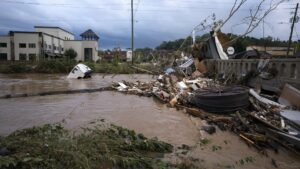When a natural disaster strikes, such as Hurricane Helene, the aftermath can be chaotic. States affected by such disasters often warn residents to be on the lookout for scams, particularly price gouging. Price gouging occurs when prices for goods and services significantly increase during emergencies or disasters, taking advantage of people’s desperation.
North Carolina Attorney General Josh Stein recently reported an increase in complaints related to price gouging after the storm. Despite the state’s anti-price gouging law, his office received more than 100 complaints regarding fuel, grocery, and hotel prices. This serves as a reminder that even during times of crisis, there are individuals who may try to exploit the situation for personal gain.
Attorneys general in other affected states like Florida, Georgia, South Carolina, and Tennessee have issued similar warnings about price gouging. It’s essential to differentiate between normal price fluctuations and blatant price gouging, like doubling the price of bottled water or increasing the cost of essential items to take advantage of consumers in need.
In response to the issue, Vice President Kamala Harris has proposed a national ban on price gouging to protect consumers from such practices. However, critics argue that anti-price gouging laws could have unintended consequences for businesses and consumers by interfering with the supply chain.
Aside from price gouging, consumers should also be vigilant against other scams that tend to emerge in the aftermath of a disaster. Imposter scams, where individuals pose as FEMA representatives or insurance agents, can target vulnerable individuals seeking assistance. To avoid falling victim to such scams, it’s crucial not to share personal or financial information with unfamiliar individuals and to verify the legitimacy of services offered.
Moreover, residents should be cautious of door-to-door offers for home repairs and demands for upfront cash payments. Before hiring contractors or making significant purchases, it’s advisable to do thorough research, check references, and verify credentials to avoid falling prey to fraudulent schemes.
As recovery efforts continue after a disaster, the risk of charity scams also increases. To ensure donations reach legitimate organizations, donors should verify charities through reputable websites like Give.org or CharityNavigator.org. Avoiding online petitions for money, crowdfunding campaigns, or suspicious websites can help protect against charity scams targeting well-intentioned donors.
In the face of a natural disaster, it’s crucial to remain vigilant and informed to safeguard against price gouging and other fraudulent schemes. By staying aware of potential scams and taking steps to verify information and services, individuals can protect themselves and their communities during challenging times. Stay informed and remain cautious to protect yourself and your finances in the aftermath of natural disasters. Be sure to stay connected with Extreme Investor Network for more valuable insights on personal finance and wealth protection.

